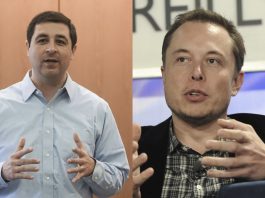Was Ronald Reagan perfect? No. But he was the perfect man for the time. Was the Reagan movie perfect? No. But it’s the perfect movie for THIS time.
What’s happened to film criticism in this country? Movie critics have turned into elite snobs who seem increasingly incapable of separating their liberal politics from analysis. Unfortunately for them, half of the country doesn’t agree with their personal politics. It makes reading movie reviews these days predictable and, frankly, an obnoxious bore. I don’t remember Roger Ebert clouding his movie reviews with ideological snobbery.
We ran into the same thing when we reviewed Matt Walsh’s documentary “What Is a Woman?” Largely ignored by critics but loved by massive audiences, we won a Milwaukee Press Club award for that review.
Yes, Reagan is a political movie. However, when the values that deeply move so many audience members are the very things that almost every published critic mocks, Houston, you’ve got a problem.
“Reagan was no hero,” sniped one critic, trashing the movie as “an ahistorical conservative fairytale.” Another critic snob wrote, “It’s hard to find oneself caring.” Well, everyone we know who saw the movie cared. Let me explain why.
To elite critics, Reagan is no crossover figure. He’s just another polarizing caricature in our ugly modern political divide, a figurative movie reviewer’s effigy for Trump. Their reviews are certainly torching that. I’m old enough to remember the concept of a “Reagan Democrat.” I’m also old enough to remember the Berlin Wall.
The dead giveaway is the wide gap between the elite critics’ and audience scores on Rotten Tomatoes for the Reagan movie. On that site, 98 percent of the audience liked the movie, but only 20 percent of critics gave it a positive score. That’s a major disconnect. On my social media pages, most people adored the movie. Several even said they cried.
It appears that Donald Trump has broken film criticism. So, yes, let’s get political, since the critics have made it all about that.
Film critics say Dennis Quaid turned Reagan into a hagiographic caricature. While it’s true that Quaid’s Reagan was a simplified version of a complex man, he also captured a lot of essential and substantial truths. The movie stands as a must-see reminder to modern audiences of the perils of Communism and the importance of preserving peace through strength (who does that remind you of?). Absolute kudos to director Sean McNamara for getting this movie made.
It’s worth noting that many young people going to the polls this November have never heard of the CCCP. They don’t remember the brutality of Communism, “Red Dawn,” the Cold War, “The Day After,” Khrushchev pounding his shoe, or the Berlin Wall. They need this movie. America does.
The movie smartly frames itself around a Soviet perspective – an ex-KGB narrator who is portrayed by the great Jon Voight and who helps a young Russian agent understand how “Crusader” Reagan caused the doomed Soviet Union’s eventual collapse. Did other things also cause the Soviet Union’s collapse? Sure. But this isn’t a history textbook. And you can’t take the leader out of the time.
I am old enough to have visited East Berlin while it was still Communist and the Berlin Wall stood. The next year, it came down. I remember how vacant the stores were, how gray the streets were, and how terrified the populace was. In contrast, West Berlin was like Times Square. Younger voters remember none of this.
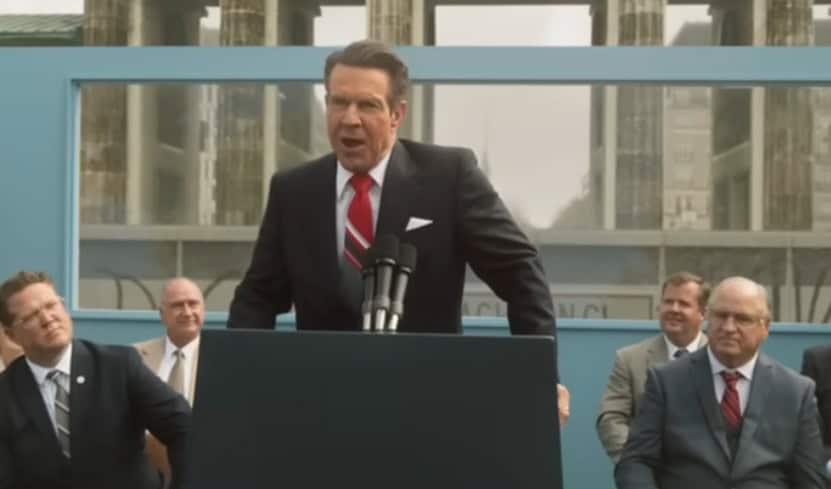
I also remember the greatly unfair image of Reagan that came through the warped media filter in my northern Wisconsin town, where we only got a single newspaper and television network in the days before the Internet and cable. In high school, I thought Reagan was a forgetful dunce. The liberal media caricatured him in real-time. This movie is the opposite.
My opinion of Reagan sharply changed when I had the privilege of hearing him speak at the 1992 Republican National Convention in Houston, where I was working as an intern for “CBS This Morning.” I stood on the convention floor, heard him speak outside of the biased media filter, and thought, “Wow. Now I get it. Now I get his appeal.” I don’t remember a single word he said. I remember how he made me feel. He was full of optimistic patriotism. He believed in this country and its future. I have since looked up that speech.
“Whatever else history may say about me when I’m gone, I hope it will record that I appealed to your best hopes, not your worst fears, to your confidence rather than your doubts,” Reagan said.
Interestingly, that’s exactly what this movie does.
The Reagan movie is a needed reminder that capitalism’s victory over communism’s tyranny was not a sure thing, and patriotism is not a bad word. Freedom must always be safeguarded. There is evil in the world, and all systems of government are not created equally. Shows of strength prevent war. America, while never perfect, is the greatest beacon of freedom the world has ever known.
It’s hard not to see Biden and Harris as the Jimmy Carters in this parable.
To younger voters, socialism is now a cool concept popularized by kindly old Bernie Sanders, where you get free stuff. To the COVID generation, it’s not problematic for the government to hand everyone a check.
This generation also lives in a world where they are inundated with messages about caving into despots or just giving them a lot of money (Iran!). Young people are being raised in a world in which good and evil are flipped. Despots are simply misunderstood. Chickens came home to roost. Cops are the villains, so defund the police! Israel is attacked by terrorists, but they’re the bad guys! Even gender is a muddled concept. The left wants to convince schoolchildren that America is an irredeemable oppressor.
Come to think of it, no wonder the elite liberal critics hate this movie! Reagan’s greatest strength was clarity. There were no Harris word salads for him.
Reagan was a binary individual, and he knew you aren’t going to mobilize a country to defeat an enemy you can’t define. When he labeled the Soviet Union the “evil empire,” or implored Gorbachev to tear down this wall, Reagan defined the fight. This wasn’t as simple as it sounds; he faced significant pressure from within his administration to tone down the rhetoric. It was interesting to see the old characters, long forgotten but so much a part of my childhood, recreated on screen. George Shultz. Tip O’Neill (back when Democrats and Republicans could work together). Gorbachev.
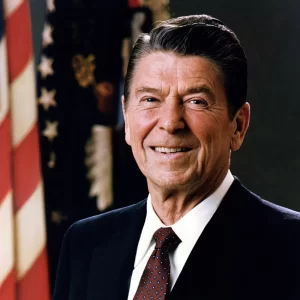
One of the most compelling lines in the movie was when Reagan said he was going to win the Cold War through words. But they were words of strength.
Reagan was also a believer that you should psychologically outmaneuver your enemy. He was a genius at symbolism and clarity. Reagan used television like Trump uses Twitter (X). Different tones, but the point is that they both embraced a new medium to reach audiences. It did occur to me that Reagan’s evil empire was outside America’s shores. The affable Reagan seemed strong without ever seeming mean. He called people out without calling them names. Trump’s enemies are internal. One can only hope that Trump pivots and finds his inner Reagan. In some ways, though, he already has. There are also analogies. They’re both the cowboy characters in spaghetti westerns, embodying American archetypes.
Was Reagan perfect? No. But he was the perfect man for the time. Was the movie perfect? No. But it’s the perfect movie for this time. Perhaps one could say the same for Trump.
Although Quaid captured Reagan’s strength, his strategic gifts, and his foresight, I’m not quite sure he captured the softer side or Reagan’s gentle affability. Reagan was extremely funny. He was a bigger personality. He was, at heart, a storyteller in the old Irish tradition who loved a good anecdote. Quaid became a version of Reagan, but I’m not sure I ever fully thought of him as Reagan instead of Dennis Quaid playing Reagan. For some reason his physicality reminds me of Nixon more than Reagan. That’s partly because of Quaid’s somewhat distracting facial prosthetics, his age, and the fact he’s, well, Dennis Quaid. It’s very difficult for a known actor to make you think they’re another known person. It’s easier for an unknown actor to do this. Think Austin Butler’s dead-on portrayal of Elvis Presley or Claire Foy embodying a young Queen Elizabeth II.
Still, Quaid’s courageous and moving performance was a valiant one, and he captured enough of Reagan’s essence to deserve praise.
The movie is a sweeping timeline of Reagan’s life. While there were interesting angles I never knew about his childhood and his time with the actor’s guild, I’m more partial to bio pics that capture a person’s essence by chronicling a single moment. You can go deeper that way. For example, consider the phenomenal portrayal of Princess Diana in 2021’s “Spencer,” which captured her crumbling marriage through the psychological prism of a single Christmas. Reagan, arguably, tried to pull off too much, barely scraping over momentous periods in history, like the assassination attempt, Korean Air Lines Flight 007, and Reagan’s time as California governor. When they showed Reagan’s assassination attempt, I recalled how the country was united in horror. Contrast that to the assassination attempt of Trump, which the media and half the country seem to have largely moved on from. “Honey I forgot to duck.” “Fight, fight, fight.”
And fight Reagan did.
Then again, for younger audiences who know so little of these historical moments, the panoramic view may be more instructive.
One of the greatest successes of the Reagan movie was its deeply sweet portrayal of the Reagans’ marriage. Penelope Ann Miller was endearing as Nancy Reagan and should win an Oscar (good luck with that in liberal Hollywood, though). Nancy Reagan has previously been unfairly stereotyped as a dress-obsessed, controlling “just say no” harridan by the liberal media. In this movie, Nancy is redeemed as a devoted, fervently loyal spouse who is willing to share her husband with a nation because it’s what he and the country need. When the real-life Nancy is shown placing her head on the real-life Reagan’s casket, and gently strokes the casket with her hand, it’s impossible not to care.
All of this is completely lost on the critic snobs. Ignore them, and go see this movie. Better yet, take someone younger than 35 with you.
This is a movie review.
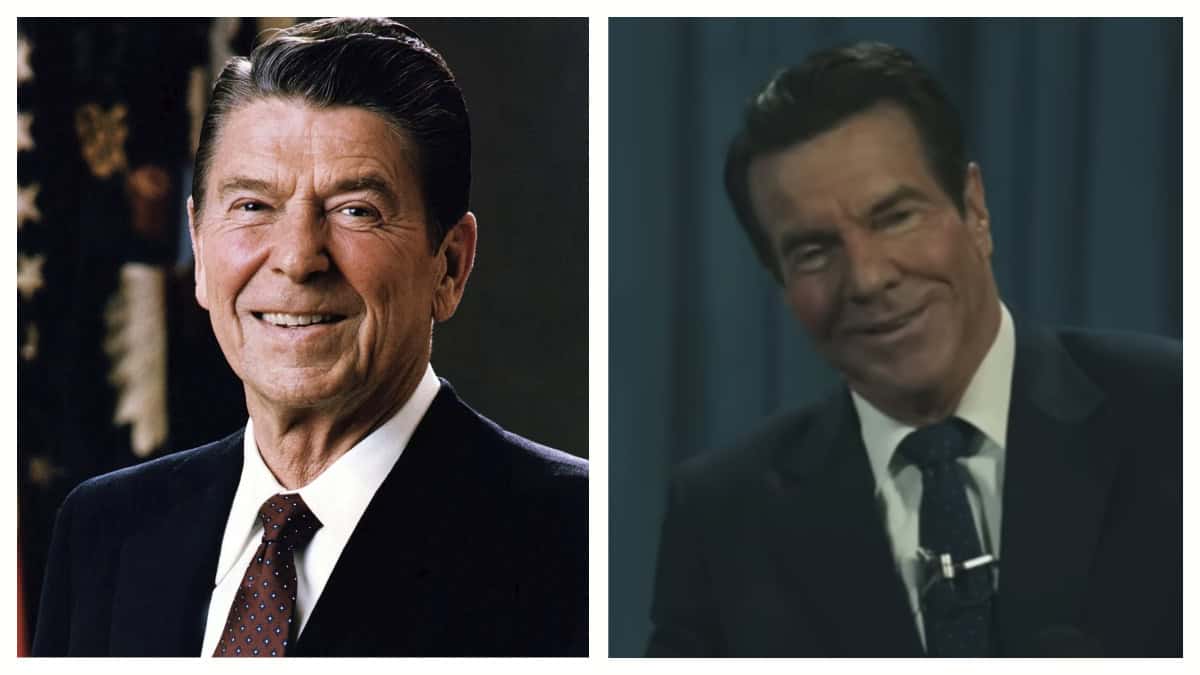






![WATCH: Elon Musk Town Hall Rally in Green Bay [FULL Video]](https://www.wisconsinrightnow.com/wp-content/uploads/2022/04/Elon_Musk_3018710552-265x198.jpg)

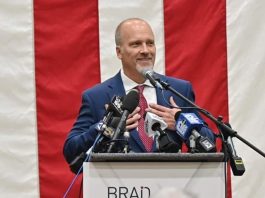

![The Great American Company [Up Against the Wall]](https://www.wisconsinrightnow.com/wp-content/uploads/2025/03/MixCollage-29-Mar-2025-09-08-PM-4504-265x198.jpg)
![The Wisconsin DOJ’s ‘Unlawful’ Lawman [WRN Voices] josh kaul](https://www.wisconsinrightnow.com/wp-content/uploads/2025/03/MixCollage-29-Mar-2025-08-48-PM-2468-265x198.jpg)

